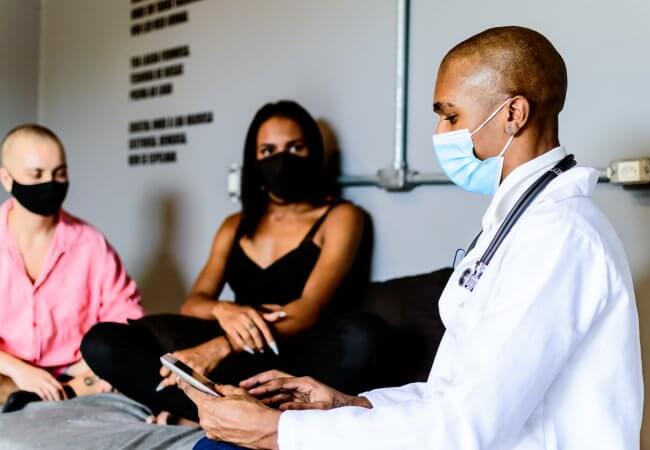
May 16, 2023
Going Back to School to Advocate for Vulnerable Transgender People

Being an equity-minded nurse means not only having the desire to help and advocate for those who need help, but being that nurse who also has the right knowledge, skills and ability to represent those you serve. One of the essences of becoming an equity-minded nurse is to ensure that as a nurse, one can promote a gender-affirming environment in his or her own nursing practice. Approximately 25 million people around the world identify as transgender, and the numbers are growing because of the changing mindset of society about the concept of transgenderism. While the visibility of transgender communities has increased, significant health care disparities remain. Transgender individuals report being less inclined to share their sex assigned at birth due to fear of stigmatization and mistrust of the medical and health care community in general. The mistrust and inequity experienced by transgender individuals are not limited to clinical care and may extend to research as well as well as education.
These are all factors that made me decide to go back to school, joining the world of psychiatric/mental-health nursing nurse practitioner education in mid-2022.
Many of my friends and colleagues asked me, why are you doing this? Well, the answer is simply that I am determined to be the best nurse I can, and to be that person of knowledge and skills who can advocate for those who need assistance the most: transgender individuals who may suffer from trauma and difficulties. To advocate for them, it requires not only an assurance, but an individual who is experienced with their situation and can empathize when nobody else can. It is one of the immense deeds I hope to do as a nurse, to serve the transgender communities as a professional health care provider equipped with not only the desire to help but with appropriate knowledge and skills.
To provide representation for transgender people in nursing practice as a future advanced practice nurse is a way of being a role model. Having a fellow transgender person available to help, and equipped with the right knowledge and skills — whether providing a treatment, care for mental health problems or assisting in the process of transitioning — is significant in promoting gender-affirming health care. The ability to not only represent, but to truly work with transgender individuals and their mental health needs is a societal commitment. The lack of people who can congruently understand the plight of transgender people and their mental health needs drove me back to school and the world of clinical nursing once again. And this time it will not only be as a nurse leader, but as an advanced practice nursing student who in the future will advocate for the vulnerable and underrepresented transgender individuals in our society as their primary care provider.
To study psychiatric/mental-health nursing and be licensed or certified as a Psychiatric Mental Health Nursing Practitioner (PMHNP), I have to enroll in an accredited program recognized by the California Board of Registered Nursing, as well as accredited by the Commission of Collegiate Nursing Education (CCNE). The post-MSN psychiatric mental-health nursing program of one outstanding university is a combination of online learning and 500 hours of actual clinical experience under the preceptorship of a qualified and willing licensed PMHNP, psychiatrist, or clinical psychologist. Finding a willing and nurturing preceptor inclined to help others become part of this practice is not easy. Hours of writing letters and sending information to multiple mental health practitioners can be daunting and seem endless. However, if one’s yearning is true and positive towards helping others, I believe the Almighty father is always there to guide you in the proper direction. I am thankful to a colleague at the Philippine Nurses Association of Southern California (PNASC) for directing me to one of her friends, who accepted me for my clinical. My PNASC family supports me emotionally and is supportive of my advocacies. With their cheers and support, I am positive that I can do this journey, no matter how much time, effort, and money it takes me to finish. I must ensure that another nurse, another health warrior for diversity, equity, and inclusion, joins our workforce as an instrument for change for others.
Advocacy is very much the core of both the Philippine Nurses Association of America (PNAA) and the PNASC. I believe that with my newly gained knowledge and skills, I will become a patient advocate and champion the health and well-being of transgender individuals at a time when they cannot do it for themselves. I firmly believe that as a nurse, it is our duty and commitment to model empathy and compassion. This is what makes the best nurse and can make the most dramatic difference in a patient’s life, especially when they are at their most vulnerable. This is the essence of being a PNASC/PNAA nurse, to advocate and be that instrument for change, be that equity-minded nurse. It is my dream and goal to be that nurse who can truly promote not only health among patients, but also champion culturally congruent care among transgender individuals in treating and caring for their mental health issues.

Sasha A. Rarang, PhD, MSN-Ed, CCM, RN, a trans person, is an advance practice nurse with more than 20 years’ experience in clinical nursing, nursing administration, and nursing education. The dean of nursing for Angeles Colleges in Los Angeles., Calif., she is also pursuing certification as a psychiatric mental health nurse practitioner (PMHNP). She currently serves on the boards of the Philippine Nurses Association and the Philippine Nurses Association of Southern California. Recently, she chaired the Diversity, Equity, Inclusivity, Belongingness and Social Justice Task Force for the Future of Nursing 2020-2030: Charting a Path to Achieve Health Equity report from the National Academy of Medicine.
Lead photo credit: (c) GETTY IMAGES/rparobe
